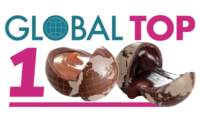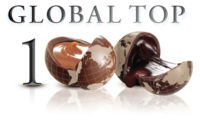This year has been bad for some confectioners, great for others — but life continues to move on. Like years past, there have been acquisitions, expansions, and changes in leadership — almost as if in spite of this horrible pandemic. Yet, what is most telling is how the “little guys” have adapted to make their life’s work continue onward.
As in most cases, the large companies — especially the ones who sell in the grocery market — are making out just fine, some even better than last year. Ferrero and Haribo are set to build their first-ever U.S. manufacturing facilities, while Mars is buying up another big company.
Mars Wrigley has always been tight-lipped about its confectionery sales. Its parent company, Mars Inc., which also includes pet care and other foods, does $40 billion in sales, according to its website, which is $7 billion more than in 2016. But when they acquire KIND Healthy Snacks, as expected, one can assume Mars is just going to stay at the top of the food chain (candy chain, to be exact) for a long time.
KIND, which has an estimated $1.5 billion in annual sales, has been reported to have been purchased for $5 billion and to be operated as a separate entity, though that was not confirmed when this story we posted. KIND has been growing each year and just acquired nut-free nutrition bar company Nature’s Bakery in December.
Italy’s Ferrero Group, the second largest candy company in the world, keeps growing and will be building its first chocolate plant in North America in Bloomington, Ill. The $75 million investment will expand on existing non-chocolate operations, adding 70,000 square feet and an estimated 50 jobs. The new plant will produce Crunch, 100Grand, Sno-Caps, Raisinets, Goobers, Ferrero Rocher and others. In the last few years, Ferrero Group has bought out Ferrara, Harry London, Fannie May, Nestle U.S. operations, and Kellogg’s Keebler brand.
Germany’s Haribo is set to begin construction on its first-ever North American factory in Pleasant Prairie, Wis., which also should be one of the largest factories in the industry. Reportedly, the company is investing $300 million on the project and is expected to create 385 jobs. No word when it will start construction.
Some of the candy companies are not as fortunate.
Companies that rely heavily on fundraising bars such as World’s Finest Chocolate of Chicago endured some of the worst of it because of school closures. World’s Finest dropped from $160 million in 2019 to about $100 million in 2020, which pushed them off the 2021 Global Top 100 list.
With Italy especially hit hard, Ulrich Zuenelli, executive chairman of A. Loacker AG/SpA, says the Italian confectioner had substantial loss in its out-of-home channels of duty free, travel retail, foodservice, vending, coffee shops and stores.
In Pennsylvania, Just Born Quality Confections saw a 5 percent shortage due to the pandemic, according to Matt Pye, marketing director.
“Despite being an essential business, we closed our doors for six weeks at the start of the pandemic putting the health and safety of our associates as our No. 1 priority,” Pye says. “We lost six weeks of everyday sales and had to pull out of Halloween, Christmas and Valentine’s Day seasons so we could focus on delivering our No. 1 season – Easter.”
Rausch Schokoladen GmbH, of Berlin, saw a “sharp drop” in sales at its Chocolate House, because the café had to close, according to company spokesperson Fenja Zwiseley, yet its online business is doing better than before. Rausch had left retail in 2015, and it moved all operations under one roof to ensure quality.
“Fortunately, we set the course here early enough,” Zwiseley says. “Chocolate is a crisis-proof product, and we have realized that customers are longing for a moment of enjoyment and little time-out, especially now, to escape the challenges of everyday life for a brief moment – because chocolate makes you happy.”
Companies that specialize in online sales were able to adapt better. 1-800-FLOWERS.COM Inc. increased sales by $185 million to a projected $810 million due to the increase in online shopping and product category expansion.
“Customers have been increasingly turning to our family of brands to help them connect with friends, family, co-workers and others more than ever,” says spokesperson Kathleen Waugh. “This is a sentiment we believe will be a long-lasting impact of this pandemic. Companies like ours are well-positioned to continue to help people express, connect and celebrate during this health crisis and beyond.”
Bazooka Candy Brands also saw growth, 2 percent, projecting year-end sales for 2020 to be $242 million.
“The company is faring very well through these unfortunate times,” says President Tony Jacobs. “As you would expect, our e-commerce business has grown significantly.”
Launching reduced-sugar confections has helped Georgia Nut Co.
“This has been a trend that we’ve seen increase momentum since the beginning of COVID as consumers were less active and focused more attention on what they were eating,” says John Drehobl, director of sales and marketing for the Illinois company. “Georgia Nut has been very fortunate. Our employees have done a great job through challenging times, and we’ve been very lucky to have many great partners in grocery and e-commerce.”
Nestle, of Switzerland, had losses of 12 percent in its confectionery division for the first nine months of 2020 over the previous year, but saw a 47.6 percent increase in e-commerce.
As with many of the confectioneries, learning to focus on new markets, specifically e-commerce, has helped them as well.
“To adapt to the changing times, we’ve introduced a totally online fundraising program and modified our traditional fundraiser to include a virtual kickoff, virtual sales tracker, virtual payments and curbside pickup components to our traditional fundraising program,” says World’s Finest Chocolate spokeswoman Kate Pacynski.
Argentina’s Arcor also launched an e-commerce platform during the pandemic, Arcor en Casa (Arcor at Home), which has been growing since May.
“(It) has become a key channel between the company and our consumers,” says a company email. “We strengthened our work in other online sales channels in order to guarantee access to food.”
Other companies, like Promotion In Motion, which specializes in interactive and licensed products, had to limit their production with so many employees working remotely.
“We did have to limit production to our Top 50 selling SKUs and lost Easter, Halloween and Christmas,” says CEO Michael Rosenberg. “But all in all, we made up for it with very strong overall demand.”
He projects sales for 2020 to finish around $510 million and 2021 to be between $550-$575 million.
Slavyanka said its sales suffered during the pandemic due to border restrictions and lower export sales.
“But our sales are recovering, and we expect double growth …next year,” says a company letter. The Russian company is launching sugar-reduced confections and snack bars to increase sales, as well as starting up a B2B confectionery business.
“In a year that has been catastrophic for many businesses in South Africa, Tiger Brands has been in the fortunate position of playing a pivotal role in ensuring food supply during the initial lockdown periods,” says spokeswoman Nikki Wagner. “This allowed the company to support the livelihoods of its employees even when sites were temporarily closed in line with lockdown regulations. Notwithstanding this, the results for the year have been disappointing, reflecting the challenges faced by the company in maintaining margins in what was an already difficult consumer environment before the onset of the COVID-19 pandemic.”
She notes the cost of complying with COVID-19 regulations and health and safety measures, as well as disruptions in the supply chain due to closures, have affected the bottom line.
“The COVID situation has been challenging, not only due to its impact on consumer behavior, purchasing power, supply chain, etc., but also due to the challenges of ensuring employee safety and uninterrupted production,” says Kras Food Industry spokesperson Goran Lovrek. “We believe that the practices that have been introduced due to the epidemic will prove useful once everything goes back to normal and represent a natural evolution of doing business.”
Mergers and Acquisitions continued on
Through the pandemic, acquisitions and mergers continue.
For starters, Spangler Candy Co., of Bryan, Ohio, purchased Bit-O-Honey from Pearson’s Candy Co., of Minnesota, and will begin shipping the chewy candy bars out of its plant in Bryan. Bit-O-Honey will still be manufactured at Pearson’s St. Paul plant, for the short term, but the goal is to eventually move production to Ohio, according to Spangler CEO Kirk Vashaw. Purchase price was not disclosed. Spangler, the maker of Dum Dums, Circus Peanuts, and candy canes, acquired NECCO in 2018.
Germany’s Ruebezahl Schokoladen GmbH and Hans Riegelein & Sohn GmbH & Co. KG formed the Gubor Group, known colloquially as Ruebezahl & Riegelein, with an expected $333 million in sales combined. There will now be two headquarters, Dettingen/Teck and Cadolzburg, with Claus Cersovsky, Peter Riegelein and Ruediger Bonner all managing partners. Oliver Cersovsky passed away the previous year.
In October, Sunrise Confections, a division of Mount Franklin Foods, opened a new state-of-the-art facility in San Jeronimo, Chihuahua, Mexico, across the U.S. border of New Mexico, which can produce 130 million pounds of confections, according to spokeswoman Dawn Sykora. The El Paso, Texas company also will start shipping Wash-Ups Hand Sanitizer this month.
Denver’s Simple Good Foods Co., new to the Global Top 100 list, sold its Simply Protein brand to newly formed Wellness Natural, of Toronto, for an undisclosed amount in September. Simply Good Foods bought Quest at the end of 2019 and owns the Atkins brand, with projected 2020 sales of $817 million for its protein bars, chocolate shakes, and peanut butter confections.
Also new to the list is UK’s Hotel Chocolat Group, with estimated sales of $181 million, and Switzerland’s Läderach, with approximate sales of $138 million. Läderach continues to expand in the U.S., announcing in December the opening of a flagship store in New York City. The Swiss chocolatier also announced this month it would assume the leases of 34 U.S. GODIVA stores.
There were a few changes in leadership this year as well. Bahlsen has its first non-family member running the show. The German cookie maker hired Phil Rumbol to be the new CEO last April. He has 30 years of commercial experience including working at Cadbury and Kraft.
Switzerland’s Kambly SA also has a new chief with Dr. Nils Kambly replacing Hans Martin Wahlen as CEO, and Oscar Kambly continues as chairman.
Haribo celebrated its birthday in 2020 by releasing Passport Mix, a variety of gummies from around the world, to engage consumers in celebrating the 100-year anniversary of Haribo.
Business was pretty much as usual this year because “we produce, operate and make decisions locally in many markets (and) we were able to maintain production without major interruptions,’’ says spokeswoman Lauren Triffler. “Now more than ever, consumers are looking for simple ways to find moments of happiness and comfort in their daily lives. Haribo inspires those joyful moments with a trusted, high-quality gummi treat.”






